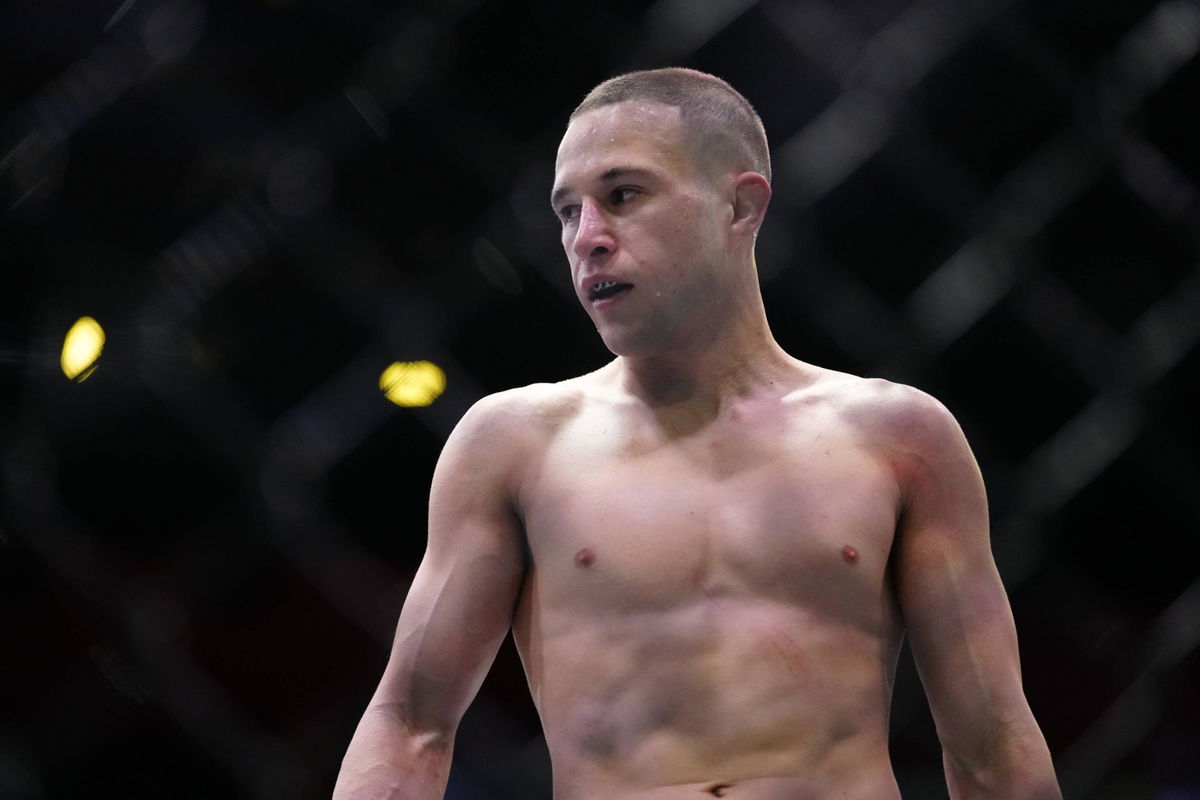
Imago
June 3, 2023, Las Vegas, NV, LAS VEGAS, NV, United States: LAS VEGAS, NV – June 3: KaI Kara-France and Amir Albazi compete in a 5-round bout at UFC Apex for UFC Fight Night – Vegas 74- Kara-France vs Albazi on June 3, 2023 in Las Vegas, NV, United States. Las Vegas, NV United States – ZUMAp175 20230603_zsa_p175_035 Copyright: xLouisxGrassex

Imago
June 3, 2023, Las Vegas, NV, LAS VEGAS, NV, United States: LAS VEGAS, NV – June 3: KaI Kara-France and Amir Albazi compete in a 5-round bout at UFC Apex for UFC Fight Night – Vegas 74- Kara-France vs Albazi on June 3, 2023 in Las Vegas, NV, United States. Las Vegas, NV United States – ZUMAp175 20230603_zsa_p175_035 Copyright: xLouisxGrassex
Kai Kara France has always been a fighter. The UFC flyweight star, despite his diminutive size, is one of the best flyweights in the entire world. The Kiwi started on his martial arts journey out of necessity than anything else. Bullied by his schoolmates for his size, the Auckland native started learning Brazilian Jiu-Jitsu at eight to try and protect himself against them.
Watch What’s Trending Now!
In 2016, he was called to ‘The Ultimate Fighter’ with the promise of a UFC contract if he impressed on the promotion’s flagship reality TV show. But Kara-France crashed out in the quarterfinals, with his UFC dreams seemingly coming to an end. Always a fighter, Kara-France didn’t give up and went on a five-fight win streak in the local New Zealand MMA circuit, earning himself a UFC contract in 2018. This warrior spirit of his is also represented in the only ink he has on his body.
ADVERTISEMENT
What does Kai Kara-France’s back tattoo mean? Does it have a Maori connection?
Kai Kara-France is a New Zealand national, having been born and raised in the country’s picturesque capital of Auckland. Like many of his compatriots, the UFC flyweight comes from Maori ancestry. This is nowhere more apparent than the sole tattoo he has on his body.
View this post on Instagram
From as far back as they can remember, the Pacific Islanders have held tattoos as an incredibly important part of their culture and indeed life. Why? Well, in olden times, tattoos represented a person’s life and journey, they were a visual representation of everything they were and had been through. Although tattoos’ significance has evolved over time, they do remain central to their cultures.
ADVERTISEMENT
Kara-France’s piece de resistance is his impressive and substantial back tattoo. Done in all black, it is a beautiful, symmetrical tribal piece that starts from the back of his neck and goes down to his lower back. His back tattoo is clearly inspired by his heritage, and is a representation of the journey he has been in his life, according to the caption of an Instagram post he revealed the tattoo in. “The things we have done in the past become our future.” Let us now look more closely at his heritage and ancestry.
ADVERTISEMENT
Kai Kara-France’s deep connection with the Maori culture
Just like his life story and journey to becoming a fighter, ‘Don’t Blink’s has a very interesting and intriguing ancestry. In him runs the blood of quite a few of the multitudes of Pacific Islander tribes and nations. As we said before, Kara-France is of Maori heritage ancestry. But only partly. Among his ancestors, the Kiwi can proudly identify the members of the Waikato, Ngati Tūwharetoa, Ngati Kahungunu, and Tuhoe peoples.
Such an important role does the Auckland resident’s cultural heritage play in his life that when he is not fighting or in camp for a fight, he goes to scenic Tahiti, to train fellow Pacific Islander fighters there. But even there, more than two and a half thousand miles away from his birthplace, he has distant relatives.
Top Stories
Dana White Cuts Israel Adesanya Teammate After UFC 325 Cheating Controversy

Court Announces Verdict on Ilia Topuria-Giorgina Uzcategui as UFC Champ Puts Justin Gaethje on Alert

Justin Gaethje Gives Definite Retirement Timeline Ahead of Rumored Ilia Topuria Clash At White House

Jorge Masvidal Calls Veteran Referee the ‘Worst Ever’ After UFC 325 Blunder

Ex-UFC Champion Shares Emotional Update Before Cancer Surgery Ahead of Title Fight

One of the most significant and moving experiences in the Kiwi’s life was him running into an old woman at a lodge in Tahiti. The woman, a Tahiti native, had some common blood with Waikato Tainui tribal confederation, which is part of the flyweight’s ancestral groups. He was fascinated by the interaction and truly appreciated how connected all of the Pacific Islander people were. All of this goes to show that despite having lived all his life in Auckland, far from his ancestral villages, Kai Kara-France has a deep and enduring connection with his Maori heritage. What are your thoughts on Kara-France’s ancestry?
ADVERTISEMENT
ADVERTISEMENT
ADVERTISEMENT
ADVERTISEMENT